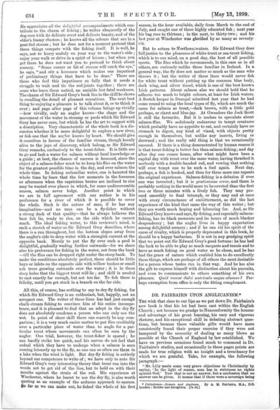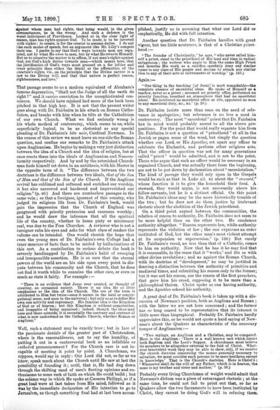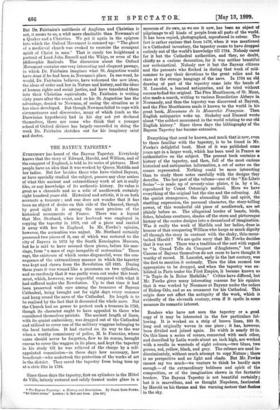DR. FAIRBAIRN UPON ANGLICANISM:* THE wish that rises to our
lips as we put down Dr. Fairbairn's new book is that his lot had been cast within the English Church ; not because we grudge to Nonconformity the honour and advantage of his great learning, his easy and vigorous rhetoric, and his exceptional skill in debating abstract ques- tions, but because these valuable gifts would have more consistently found their proper exercise if they were not hampered by the necessity of dealing as many blows as possible at the Church of England by law established. We have on previous occasions found much to commend in Dr. Fairbairn's studies, and occasionally in these pages points are made for true religion with an insight and a trenchancy for which we are grateful. Take, for example, the following paragraph :— " Mr. Lilly meets some very grave objections to Christianity by saying, In the light of reason, man has in strictness no rights against God.' Now that is not an answer, but a confession that no answer can be given. It means that if there were a sovereign being
• Catholicism—Boman and Anglican. By A. M. Falrbalru, D.D. London ; Hodder and Stoughton. [7s. ed.]
-igainat. whom man had rights, that being would, in the given circumstances, be in the wrong. And such a defence is the worst indictment of Providence. Looked at in the clear light of reason, man has rights against God. To be made, is to be invested with rights ; to create, is for the creator to assume duties. I do not like such modes of speech, but an argument l ke Mr. Lilly's compels their use. I prefer to say that God's ways towards men are regu- lated, not by what He owes to men, but by what He owes to Himself. But so to 'conceive the matter is to affirm, if not man's rights against God, yet God's high duties towards man—which means here, that the justification of God's ways must proceed on a far loftier and truer principle than either the denial or the affirmation of the creature's rights, viz., on the principle that the Divine nature is a law to the Divine will, and that that nature is perfect reason, righteousness, and love."
That passage seems to us a modern equivalent of Abraham's famous deprecation, "Shall not the Judge of all the earth do right ? ". and it carries conviction to the unsophisticated con- science. We should have rejoiced had more 'of the book been pitched in that high key. It is not that the present writer goes along with Dr. Fairbairn in his attack on Roman Catho- licism, and breaks with him when he tilts at the Catholicism of our own Church. What we find seriously wrong is his whole method of controversy, which seems to us, while superficially logical, to be as rhetorical as any special pleading of Dr. Fairbairn's bite noir, Cardinal Newman. In the course of this review we must leave on one side the Roman question, and confine our remarks to Dr. Fairbairn's attack upon Anglicanism. He begins by making a very just distinction between the idea of a Church and the idea of religion, but at once erects these into the ideals of Anglicanism and Noncon- formity respectively. And by and by the astonished Church- man finds himself set down in an antithesis, with his Master in the opposite term of it. " The difference between the two doctrines is the difference between two ideals, that of the Son of Man and that of the Son of the Church. If the Anglican revival has sublimed and softened and enriched our worship, it has also narrowed and hardened and impoverished our religion." (p. 40.) And there are numberless passages in the same vein ; so that a foreigner, ignorant of this country, who judged its religious life from Dr. Fairbairn's book, would gain the impression that the Church of England • was gangrened with priestly pretension and sensuous worship ; and he would draw the inference that all the spiritual life of the country, whether in home piety or missionary zeal, was due to the Free Churches. A reviewer who is not a foreigner rubs his eyes and asks for what class of readers the volume can be intended. One would cherish the hope that even the young men of Dr. Fairbairn's own College had a truer measure of facts than to be misled by hallucinations of this sort. As a contribution to serious debate the book is severely handicapped by Dr. Fairbairn's habit of sweeping and irresponsible assertion. He is so sure that the eternal powers of the world are on his side upon every point in dis- pute between his community and the Church, that he does not find it worth while to examine the other case, or even so much as state it fairly. For example .
"There is no evidence that Jesus ever created, or thought of creating, an organised society. There is no idea He so little emphasises as the idea of the Church. The use of the term is attributed to Him but twice—once it occurs in the local or congre- gational sense, and once in the universal ; but only so as to define His own sole activity and supremacy. His familiar idea is the Kingdom of God or of heaven; but this Kingdom is without organisation, and incapable of being organised • indeed, though the ideas may here and there coincide, it is essentially the contrary and contrast of what is now understood as the Catholic Church, whether Roman or Anglican." ..
Well, such a statement may be exactly true ; but in face of the passionate denials of the greater part of Christendom, where is the reasonableness, not to say the. humility, of putting it out in a controversial book as an infallible ex cathedra pronouncement 4 For the Church case is not in- capable of meeting it point by point. A Churchman, we suppose, would say in reply: Our Lord did not, so far as we know, speak much about the Church until He saw at last the poSsibility of founding it ; until, that is, He had dug down through the shifting sand of men's fleeting opinions and en- thusiasms to some rock of faith on which He could build ; but the solemn.way in which He spoke at Caesarea Philippi, as if a gteat load were at last taken from His mind, followed as it was by the immediate declaration . of His intention to go to Jerusalem, as though something final had at last been accom- plished, justify us in assuming that what our Lord did so emphatically, He did with' full intention.
Another question that Dr. Fairbairn haridles with great vigour, but too little acuteness, is that of a Christian priest- hood :— " The founder of Christianity," he says, " who never called him. self a priest, stood to the priesthood of His land and time in radical antagonism ; the writers who apply to Him the name High Priest and describe His work as a sacrifice. carefully deny any similar name to any class of His people and decline to attach any similar idea to any of their acts or instruments of worship." (p. 169.) Again:— "One thing in the teaching [of Jesus] is most remarkable—the complete absence of sacerdotal ideas. He spoke of Himself as a teacher, never as a priest assumed no priestly office, performed no priestly function, breathed an atmosphere that had no sacerdotal odour. He instituted no sacerdotal office or rite, appointed no man to any sacerdotal duty, Sc., Sc." (p. 29.) Dr. Fairbairn insists more than once on the need of rele- vance in apologetics ; but relevance is no less a need in controversy. The most " sacerdotal " priest that Dr. Fairbairn has in mind would probably assent to all the above pro- positions. For the point that would really separate him from Dr. Fairbairn is not a question of " priesthood " at all lathe Jewish or pagan sense of the word, but simply the question whether our Lord, or His Apostles, set apart any officer to celebrate the Eucharist, and perform other religious acts.
That the officer in question was not for many generations called " priest " would be admitted, and is not to the paint.
Those who argue that such an officer would be necessary in an organised Church, and was actually there from the beginning, are not to be put down by declamation about " sacerdotalism."
The kind of passage they would rely upon in the Gospels would be such as that in Luke xii. 42 about the "steward," whose function it is to give the household their food. A steward, they would argue, is not necessarily above his - fellow-servants, but he is a distinct official. On this point Dr. Fairbairn's ideas may be the more historically tenable of the two ; but he does not do them justice by irrelevant rhetoric about the abolition of the Jewish priesthood.
On a third point argued between the communities, the relation of reason to authority, Dr. Fairbairn does not seem to be more helpful than on the other two. He condemns authority altogether. " Reason represents law, while authority represents the violation of law ; the one expresses an order instituted of God, but the other man's most violent attempt at its suspension or supersession." (p. 139.) But surely Dr. Fairbairn's creed, no less than that of a Catholic, comes to him on authority. Now that he has it he may find that it is reasonable, in the sense that it "works," and fits in with other divine revelations ; and as against the Roman Church, with its doctrine of "development," he may be justified in drawing a distinction between the authority of primitiie and medimval times, and submitting his reason only to the former; but it was not his reason, nor the reason of the first preachers, that gave him his creed, supposing it to be more than a philosophical theism. Christ spoke as one having authority, and the Apostles echoed his authority.
A great deal of Dr. Fairbairn's book is taken up with a dis- cussion of Newman's position, both as Anglican and Roman ; with the latter we are not here concerned ; and the former has so long ceased to be representative that its interest is little more than biographical. Probably Dr. Fairbairn hardly appreciates this, or he would not quote a hard saying of New- man's about the Quakers as characteristic of the necessary temper of Anglicanism :— " Two sayings, an Anglican and a Christian, may be compared. Here is the Anglican : 'There is a well known sect which denies both Baptism and the Lord's Supper. A churchman must believe its members to be altogether external to the fold of Christ. What- ever benevolent work they may be able to chew, still, if we receive the church doctrine concerning the means generally necessary to salvation, we must consider such persons to be mere heathens, except in knowledge.' That is the Church's doctrine. Here is Christ's : Whosoever shall do the will of my Father, which is in heaven, the same is my brother and sister and mother.' " (p. 39.) Probably every living Churchman of weight would admit that Newman's dictum was a piece of extravagant rhetoric ; at.the same time, he could not fail to point. out that, so far as Quakers allow the two Sacraments to have been instituted by Christ, they cannot be doing God's will in refusing them. But Dr. Fairbairn's antithesis of Anglican and Christian is not, it seems to us, a whit more charitable than Newman's of a Quaker and a Christian. We get it again in the epigram into which the Oxford Movement is summed up : " The ghost of a medimval church was evoked to exorcise the resurgent spirit of Christ in man." That is surely too heightened a portrait of Lord John Russell and the Whigs, or even of the philosophic Radicals. The discussion about the Oxford Movement contains one very interesting and eloquent passage, in which Dr. Fairbairn imagines what St. Augustine would have done if he had been in Newman's place. In one word, he would, Dr. Fairbairn believes, have welcomed the new ideas, the ideas of order and law in Nature and history, and the ideas of human rights and social justice, and have translated them into their Christian equivalents. Dr. Fairbairn is writing sixty years after the event, and so his St. Augustine has the advantage, denied to Newman, of seeing the situation as it has since developed. But though Newman failed to cope with circumstances and discoveries, many of which (such as the Darwinian hypothesis) had in his day not yet declared themselves, there are some who think that a younger school of Oxford divines has largely succeeded in doing the work Dr. Fairbairn sketches out for his imaginary saint and doctor.








































 Previous page
Previous page